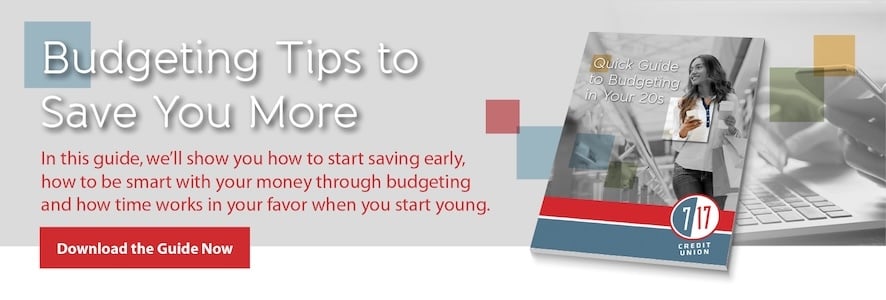- 7 17 Staff
Money Management: 5 Tips to Improve Your Finances
 An essential habit to cultivate as you move into adulthood — and to maintain throughout your adult years — is budgeting and making the most of your money. These habits are especially essential during financial periods such as inflation and recession. Considering the recent increase in prices for groceries and utilities, it’s never too late to begin a money management strategy or improve your current one.
An essential habit to cultivate as you move into adulthood — and to maintain throughout your adult years — is budgeting and making the most of your money. These habits are especially essential during financial periods such as inflation and recession. Considering the recent increase in prices for groceries and utilities, it’s never too late to begin a money management strategy or improve your current one.
Managing your money may seem stressful or overwhelming, but take it one step at a time and remember that once you’ve built these habits, it will get easier.
What Is Money Management and Why Is It Important?
Money management is crucial to your financial stability. It involves making a plan for your money each month in order to make the most of it. The plan generally includes saving money, budgeting, reducing debt and planning for your future. Managing your money ensures you’re not spending more than you’re earning, which is important for planning for short- and long-term expenses such as medical costs or other emergencies.
How to Improve Your Finances
Managing and improving your finances is an ongoing process, but it’s worth it. Let’s take a look at some of the key ways you can improve your finances.
1. Inventory Your Finances
The first step toward improving your finances is to understand what your current financial situation is and to be honest about it. If you’re not honest with yourself and understand what your weaknesses are, you can’t create an accurate picture of your finances.
Take a look at what you’re bringing home each month after taxes, what you spend your money on each month, and most importantly, if you are overspending each month. It’s essential to assess which expenses are necessities and where you’re impulse buying or indulging. To make this easier, save your receipts for a month. At the end of the month, assess the categories of your spending as well as your checking and credit card statements.
2. Create a Budget
Once you’ve taken an inventory of your finances, look at where expenses can be cut altogether or reduced. It may be easiest to start with unused streaming services, takeout meals and impulse shopping trips.
However, don’t be too hard on yourself if you get takeout for lunch once or twice during the week. This is why it may be helpful to slowly cut back on some things. If you cut it down to nothing from the beginning, it may be harder to stick with the habit because it’s overly restrictive. It may also help to create a special fund in your budget for these “fun” expenses.
3. Pay off Debts
This plan may take longer to achieve, depending on the amount of debt and your strategy to tackle it. There are various ways to pay off debts, such as debt consolidation. However, it’s important to live within your means to avoid new balance transfer credit cards and new debts being added to your existing balances.
If you choose to pay your debts without consolidating, there are a couple of approaches you can take. However, if you continue only paying the minimum payments, it will take a long time to see any gains from paying off your debts and also make it hard to achieve your goals.
One way to address your debts is by putting extra money toward paying off your lowest-balance debt. Once that’s paid off, move to the next lowest balance. Alternatively, you could start with the highest-interest debt and, once that is paid off, move to the next highest debt.
4. Put Money into Savings
Although paying off your debts is important, it’s critical to not ignore your savings. After you’ve addressed your essentials such as rent or mortgage, food and other bills, there should be a balance between saving and paying off your debts.
This fund should cover approximately 3-6 months’ worth of your monthly bills in case of job loss or an emergency. Keep in mind that even though you’ve met your emergency fund goal, it’s a good idea to keep putting money into your savings.
5. Check In on Your Progress
Checking in on your finances regularly throughout the year will help you evaluate changes in expenses or income, savings and debts. While you’re checking your financial progress, make sure to check your credit report as well. Not only will you see how your credit score has changed, but you’ll also be able to monitor for suspicious activity.
Key Takeaways
- Inventory your finances to see what you are spending money on each month and if you’re overspending.
- Create a budget to help stick to your goals and make sure you don’t run out of money.
- Whatever debt payoff method you choose, make sure you stick with it.
- Balance your strategy for putting money into savings with paying off debts.
- Check in on your finances regularly to see what you’ve done so far and where you need to improve.
Manage Your Financial Life with the Right Tools
Get the money management tools you need to ensure you’re on the right track toward financial wellness. We’re here to help improve your financial wellness with the essential calculators, online and telephone banking, and financial education you need to manage your finances.
Not a member? Get access to all of these services and more by becoming a member and opening a checking account today!
